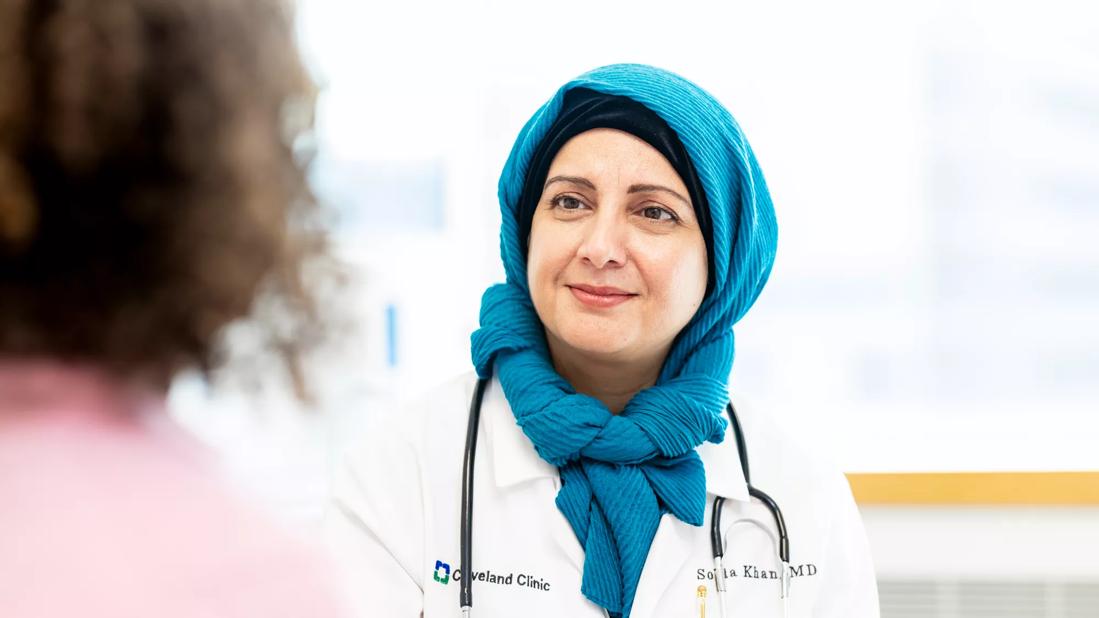
Once a taboo topic, menopause has enjoyed greater awareness in recent years, with radio and TV ads promoting remedies for vasomotor symptoms (VMS), known more commonly to women in midlife as hot flashes and night sweats.
Advertisement
Cleveland Clinic is a non-profit academic medical center. Advertising on our site helps support our mission. We do not endorse non-Cleveland Clinic products or services. Policy
According to industry estimates, the global menopause market is expected to exceed $24 billion by 2030. Certified Menopause Practitioner Claudia Mason, MD, is happy more women are choosing not to suffer in silence, but worries that as menopause becomes big business, they will be on the receiving end of misinformation and unapproved therapies..
Dr. Mason is a Florida-based, board-certified gynecologist with Cleveland Clinic’s Tomsich Health and Medical Center of Palm Beach County. She specializes in helping patients navigate the challenges of the menopause transition, which naturally starts between the ages of 45 and 55.
Menopause signifies the permanent ending of menstruation when the body is no longer releasing eggs or producing much estrogen. “Once a woman has stopped having her period for 12 consecutive months, she has officially reached menopause,” explains Dr. Mason.
More than a million women reach menopause each year in the United States, according to the National Institute on Aging. The transitional stage leading up to this point is called perimenopause, while the years following are postmenopause.
“Menopause is not a disease; it’s a normal part of life,” says Dr. Mason. “But it can manifest symptoms that range from bothersome to life-altering.”
Hot flashes, night sweats and vaginal dryness are among the most common symptoms of menopause. The Study of Women’s Health Across the Nation (SWAN study) reported that 60% to 80% of women in the United States experience VMS during their menopausal transition.
Advertisement
Other symptoms include sleep disturbances, mood disorders, and skin and hair changes, as well as sexual dysfunction and urogenital symptoms (stress incontinence, frequency, urgency, and dysuria).
“About 20% of women will not experience menopause symptoms, but the vast majority do,” says Dr. Mason. “Unfortunately, too many women just live with the symptoms and never seek help. As physicians, we need to be proactive and help initiate these conversations.”
One AARP survey found that only 50% of women surveyed ever discussed menopause with a health provider. “In particular, here in South Florida our patients come from many different countries and cultures, and oftentimes menopause is just not discussed,” she says.
As a menopause specialist, Dr. Mason makes it a point to ask about VMS during well-women visits. “It’s also important to establish patient trust so that they can feel comfortable having conversations about sexual health and other sensitive topics,” she adds.
Dr. Mason confesses to having an epiphany when reading in a national outlet about how many gynecologists have very little experience managing menopause. “There is a whole generation of my colleagues, for example, who are inexperienced with hormone therapy,” she notes.
A survey from The Menopause Society found only 31% of participating obstetrics and gynecology residency programs had any type of menopause curriculum as part of their residents’ training. Dr. Mason credits the lack of physician training for the dearth of reliable information available to patients and the inconsistency of care.
Advertisement
“If there is any good news to be found here is that the number is up from 20% in 2013,” says Dr. Mason. “But we are still doing women a great disservice.”
She points to the 75% of women who seek help for their menopause symptoms but are left untreated. If Dr. Mason had it her way, every woman would have a “menopausal visit” during the perimenopause stage of their reproductive lifecycle.
“Menopause is different for everyone and requires personalized symptom-based management,” she says. “We can provide guidance on many treatments that include hormonal, nonhormonal and behavioral treatments, as well as natural remedies.”
Another concern for patients, according to Dr. Mason, are the long-term complications related to menopause and decreased estrogen production. These include rapid loss of bone density in the immediate years following menopause and an increased risk of cardiovascular disease.
“As a menopause specialist I address both current symptoms and help mitigate future health risks,” explains Dr. Mason. “This may include hormone therapy and nonhormonal remedies.”
While it’s been more than two decades since findings from the Women’s Health Initiative (WHI) study raised concerns about the safety of hormone therapy, more recent research has led to a rebalancing of the benefits and risks, says Dr. Mason.
“At the right dose and for a limited duration, hormone therapy can be used to safely treat VMS and other menopause-related symptoms,” explains Dr. Mason. “It can also be used to prevent bone loss and associated fracture risk.”
Advertisement
But she cautions, hormone therapy isn’t right for everyone. “That’s why we need to better educate physicians on the shifting menopause treatment landscape,” she says.
Advertisement
Advertisement

Nonthermal technique reduces bleeding and perforation risk

Standardizing a minimally invasive approach for Barrett’s Esophagus and Esophageal Cancer

PSMA-targeted therapy for metastatic prostate cancer now offered at Cleveland Clinic Weston Hospital

Nationally recognized urologic oncologist offers vision for growth, innovation, and excellence

Noninvasive modality gains ground in United States for patients with early-to-moderate disease

Cleveland Clinic Weston Hospital’s collaborative model elevates care for complex lung diseases

Interventional pulmonologists at Cleveland Clinic Indian River Hospital use robotic technology to reach small peripheral lung nodules

Trained in the use of multiple focal therapies for prostate cancer, Dr. Jamil Syed recommends HIFU for certain patients with intermediate-risk prostate cancer, especially individuals with small, well-defined tumors localized to the lateral and posterior regions of the gland.